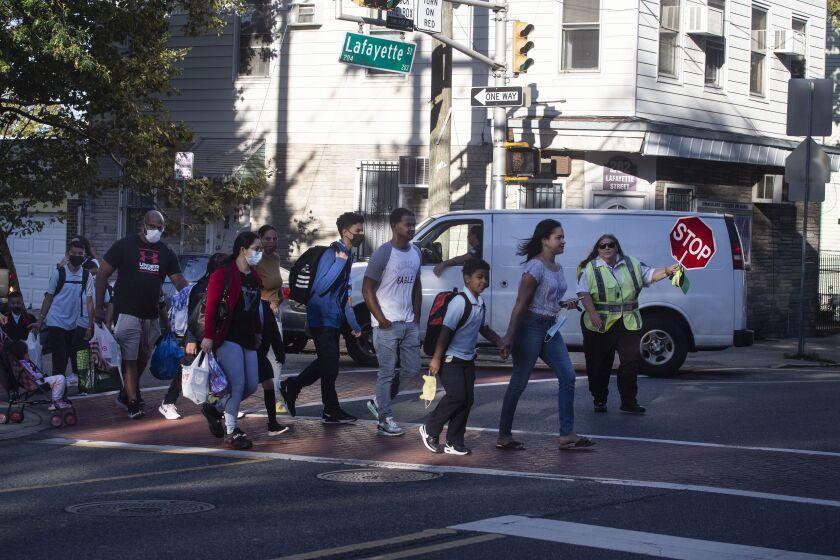Several students and parents make their way toward Newark’s Lafayette Street School on the first day of classes as a crossing guard halts traffic. Photo Credit: Erica Seryhm Lee for Chalkbeat
--------------------------------
As the school day ends, students at McKinley Elementary School in Newark’s North Ward rush for the exit. Some get into relatives’ cars and head home while other students start their journey home by crossing nearby 7th Avenue with the help of one crossing guard.
With cars zooming by on the busy street at around 2:30 p.m., older students hold hands with their younger siblings as they look both ways before crossing the street. The crossing guard on 7th Avenue holds up his hand, signaling drivers to stop, and lets children cross as he waves goodbye.
The scene may look routine, but it’s not necessarily universal. Over the last couple of years, local advocates have repeatedly raised concerns about the safety of students walking to and from school. “We really need some help here because somebody is going to be killed,” said Sharon Redding, an advocate with the Newark Community Street Team, a nonprofit that focuses on reducing violence in the community.
What often saves students from serious accidents or worse is the presence of crossing guards, who “don’t always get the respect that they really deserve because people just kind of brush them off,” said Newark Police Lieutenant Tremayne Phillips. “It’s easy to neglect them until it’s your kids that are crossing the street.”
Yet hiring people to do that sometimes life-saving work in the city is proving difficult. Schools across New Jersey — including Newark’s — are facing a crossing guard shortage. There are about 170 crossing guard positions in Newark, but only 97 of them were filled as of earlier this month, Phillips said. That’s left the police department rushing to fill 74 of them.
Crossing guards work for the Newark Police Department and are deployed to school zones and intersections near schools to help with students’ daily commutes. They work Monday through Friday from 7 a.m. to 9 a.m., and again from 2 p.m. to 4 p.m. to coincide with those commutes.
Last year, more than 600 pedestrians in New Jersey were killed, the deadliest year for pedestrians in the state since 1989, according to state law enforcement data. A report released last summer from Smart Growth America, a nonprofit advocacy group, said the rise in people killed while walking is a worsening “epidemic.”
Among the area’s traditional public and charter high schools, Science Park is the only one that has crossing guards on duty for all the available shifts, Phillips said during a virtual public safety roundtable hosted by the Newark Community Street Team on Oct. 11.
For the city’s 30 crossing guard positions assigned to charter schools, only 13 are currently staffed, and for Newark Public Schools, only 83 positions are filled out of 140, Phillips added. Some of the city’s 66 public schools have multiple crossing guard positions for nearby intersections.
A pay hike is one solution New Jersey school officials have turned to. One New Jersey district recently offered up to $50 a day to new crossing guards. Phillips said Newark’s police department offers $15 an hour to crossing guards, although that hourly wage hasn’t changed recently.
But being a crossing guard is a part-time job with no benefits. Phillips said that some new hires leave the job after just a couple of weeks once they find better paying jobs with more hours, benefits, and retirement packages.
In addition, while police officers sometimes fill in temporarily as crossing guards when those positions are vacant, those same officers may get called away to respond to reports of criminal activity, leaving school zones without crossing guards with little or no advance notice.
At the beginning of the school year, the city had used just 72% of its budget allocation for school crossing guards, with 27 applicants still going through the hiring process, according to Sharonda Morris, Newark police’s deputy director of operations.
Solving the crossing guard shortage
Before being hired by the city’s police department, applicants must undergo a criminal background check, which for some people may cause an issue. Any applicant convicted of a crime in the first through fourth degree is automatically disqualified from becoming a crossing guard, according to the police department.
One state lawmaker is trying to get more crossing guard positions filled by working with community leaders. State Sen. Teresa Ruiz, whose district includes Newark, is working on draft legislation and gathering input from the Newark School District, Mayor Ras Baraka, and the Newark Community Street Team to tackle the shortage, although she did not provide specifics about what might be included.
“Around the state and especially here in Newark students rely on crossing guards to get to school safely,” said Ruiz in a statement. “I am working on legislation, alongside the Newark School District, the mayor, and the street team to address the city’s ongoing shortage and bolster the ranks of this critical workforce.”
As part of the Newark Community Street Team’s Safe Passage program, the group’s community outreach workers patrol the streets around several South Ward schools in an effort to keep students safe during their daily commutes. Some of these workers have tried to become crossing guards but cannot, since they were previously incarcerated; these workers also help mediate neighborhood conflicts.
During the Oct. 11 virtual roundtable, Solomon Williams, deputy director for the Newark Community Street Team, said his group is suggesting that Ruiz work to lift a ban to reduce the barrier for those convicted of a crime who want to work as crossing guards. They are also suggesting adding a benefits package and retirement incentive to any future legislation from Ruiz to retain crossing guards.
Advocates like Redding also called on the county’s sheriff’s department to provide support to county roads like Route 602, known as Lyons Avenue, which is used by a number of students in nearby schools like Weequahic High and Carver Elementary.
Other advocates have suggested hiring local college students or high school seniors who may have time before or after school hours and are able to work part time.
Ultimately, the Newark Police Department indicated that most applicants end up getting hired.
“We turn down few people,” Phillips said. “As long as you’re motivated, we’ll hire you.”
Jessie Gomez is a reporter for Chalkbeat Newark, covering public education in the city. Contact Jessie at jgomez@chalkbeat.org.

